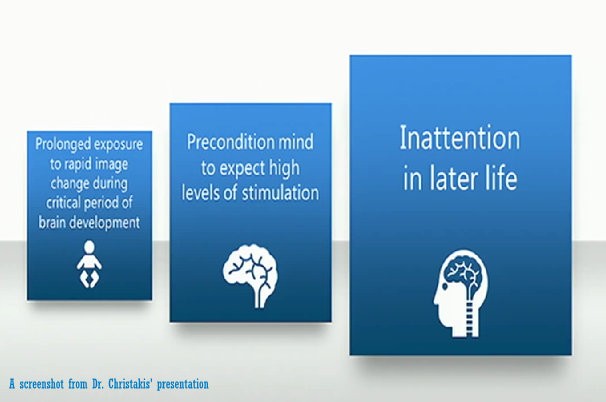TV and Attention Disorders in Children
Remember those days of yore when your mom would say, “Back away from the TV, honey… You’ll hurt your eyes!” and you would reluctantly give up the prime spot? Mothers and fathers these days are more and more aware of the harmful effects of TV. Too much TV not only affects the eyes but also the brain, leading to attention disorders.
A baby’s brain develops rapidly during the first few years of its life. In the first three years, a child’s brain has twice as many synapses as it will have in adulthood. There is a reason for this. The brain is adaptable. The brain adjusts itself according to the input it receives from the environment. The more the sensory input, the more synapses are activated. Conversely, if there is less input, the synapses are pruned. How a child shapes up is actually a result of the experiences during its early years. Too little sensory input, the child could become dull; too much, the brain becomes too active and there are damaging changes to the “wiring”.

Attention disorders: The TV connection
How much TV do you allow your child to watch? Not only the amount of TV but the kind of programs too plays a role in affecting the child’s brain. Did you know that prolonged exposure to the frenetic pace of some of the so-called “children’s shows” can make your child hyperactive and inattentive? The child’s mind becomes preconditioned to expect high levels of stimulation and the ordinary pace of life becomes too boring. Watch the TEDx video, “How TV Affects the Brains of Young Children”, and listen to Dr Dimitri Christakis, Director of the Center for Child Health, Behavior & Development, Seattle, explain his findings on attention disorders and what we can do to prevent them.
Digital gadgets and attention disorders
There are so many interactive learning apps that we can get for android or iPad, and even small children can be allowed to play with these for a little while. These mentally stimulate the children as well as give them a sense of accomplishment.
But too much of anything is bad, which is what I learnt from personal experience. My two-year-old niece became very fond of Talking Ginger and would not give up her mommy’s android tablet. To her, Ginger became as real as the rest of us and she would spend a lot of time chattering to Ginger and sometimes would totally zone us out. It took many a tantrum and almost a month for us to slowly wean her away.
Minimizing the risk of attention disorders
Early childhood experiences are critical to the development of a child. Many parents these days are cognizant of the risk for attention disorders that TV and other digital devices pose to their children, and try to give their children the best they can in terms of positive experiences.
But then there are others like me who have to turn to the TV to keep the child occupied in order to get some work done around the house. Also, TV and digital gadgets have become so much a part of our life that it is tough to keep the children away from them. Here’s how I have tried to reach a balance. I do my best to keep the house clean, but if it’s a bit untidy, I don’t let it bother me. I tell stories when I fold the laundry, although sometimes I let it pile up. We sing together when I cook. I give her veggies and fruits to taste and eat and allow her to play with dough. Sometimes, I give her spoons and bowls to keep her entertained, while I get the housework done. I play with her whenever possible and take her out whenever my evenings are free. She could be quite independent, keeping herself engaged by playing with her toys. If she wants TV, I would let her watch her favourite show, but not for more than an hour. I do those tasks that need my complete attention when she is napping or when she is otherwise engaged.
I don’t let her play with my phone or tablet or laptop. Whenever she tries to sneak up to take them, I put on a silly stern face and say, “No! These are mommy’s office stuff!” Of course, whenever I take photos of her on my phone, she manages to usurp it from me for a while so she could see!
In short, you don’t always have to resort to TV or gadgets. You don’t have to set aside a “quality time” to be with your child. Do your everyday tasks along with your toddler, and let your child observe what you do. Encourage your child to do things for herself, say, like putting on socks or brushing her teeth. Let her experience things first hand and make her own discoveries. These are the positive experiences every one of us can definitely give to our children every single day.
Child Practitioners at the Centre

Lara Ryan
Child, Adolescent & Adult Psychologist
I am a registered psychologist that works with individuals of all ages to really get to the heart of what it is they want and need to live a full life.

Lyn O’Grady
Child, Adolescent & Adult Psychologist
As a Registered Community Psychologist, I have worked with parents in community settings for approximately 10 years as well as with children and young people in school settings for 10 years.
To get an appointment or to make enquiries, please call (03) 9820-5577.
More Articles on Children
- Taking Your Child to a Children’s Counsellor
- Happy Childhood for a Healthy Heart in Adulthood
- How Can We Improve Intelligence
- Child Psychology – Raising Children
- Play as a Tool for Learning
- How to Support Children through Divorce
- Learning Disabilities
- Bullying and Depression in Children
- Supporting Children at School and Protecting Them from Bullying




